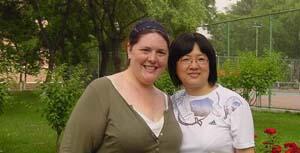By JAMES TELLA, originally published on December 18, 2007 by the USC School of Cinematic Arts
Grants from the USC U.S.-China Institute partially underwrite the USC/CUC collaboration.
What began as a summer documentary seminar in 2006 has produced not only two successful student exchanges between Beijing and Los Angeles, but also a prize-winning film that gives viewers a unique cinematic glimpse of what happens both in front of and behind the lens when East meets West.
Two Brushes, an 8-minute short by School of Cinematic Arts (SCA) Critical Studies Ph.D. candidate Chera Kee and her
 |
| Two Brushes received "the most promising award" at the Asian International Youth Film Festival. |
Communications University of China (CUC) counterpart Helen Stone, landed “most promising award” in Future Vision – the Asian International Youth Film Festival, as well as nabbed a nomination in the 9th Sichuan TV Festival International Gold Panda Awards for Documentary.
“The collaboration between the students, letting them make real connections and understand on a deeper level what the cultural differences are between them was more important than the films that were made,” said University Professor and Professor of Critical Studies Marsha Kinder. “To have this kind of reception and accolade is really great,” she added.
The SCA/CUC joint venture traces its roots back to 2006, when Kinder and Distinguished Professor of Film and TV Production Mark Harris were invited to Beijing to speak at a forum on documentary films.
The project paired six Chinese film students one-on-one with USC counterparts in Animation, Critical Studies, and Production to produce a half dozen short documentaries on the Chinese community in Los Angeles in the summer of 2006. In June of 2007, the partnership between the two schools continued with a different group of SCA students traveling to Beijing where they joined with new Chinese collaborators to produce another series of six videos.
“I never expected anything to come of this,” said Kee who worked with Stone this summer to write, direct, edit and produce the documentary Two Brushes. “We were both so passionate about what we were filming and in the end, our strong will and finding a middle ground served us well.”
Following the Chinese painter Duan Zhengqu who works in western style oil painting but uses very traditional Chinese subjects, Two Brushes examines the artist’s life and story. Although Zhengqu sees himself as a peasant, he is constantly surrounded by an entourage and lives in a multi million-dollar residence in Beijing. While Stone wanted to focus on the painter’s peasant aspect, Kee was more interested in Duan as an urban cosmopolitan. The finished film follows the two women as they argue on Two Brushes direction and the breakdown of communication between the two documentarians.
In addition to coming to terms with her collaborator, Kee found challenges on several other levels. By no means a stranger to the Middle Kingdom, (Kee has a masters in Chinese Studies from Harvard and is fluent in Mandarin) she still found Duan’s dialect difficult to understand. Kee also had to rethink some basic filmmaking logistics, such as transporting equipment from location to location.
“I don’t take things for granted at all anymore,” Kee said. “In Los Angeles I have the wherewithal to get around and just jump in my car. That was definitely not the case in China.”
Two Brushes landed “most promising award” in Future Vision – the Asian International Youth Film Festival.
Through the team’s nearly constant 14-hour shooting days, whether it was on a train or stopping in the middle of the street, Kee says filming Two Brushes was very much like “guerilla filmmaking.” On the plus side, she found a lot of the red-tape she encountered making films in Los Angeles was not such a big problem on this film. In China “there seemed to be a sense of ease” to getting what was needed, Kee said.
“What’s great about this film and all the other documentaries the students made is that just because you may know English, it doesn’t mean you and your partner are both speaking the same language,” noted Kinder. “It’s all about that process of trying to figure out what works between you and your counterpart.”
With the exchange between the two schools lasting only six weeks, pre-production for each film was limited to just a few days.
“That’s not a lot of time, especially for a film that has to be translated,” Kee said, noting that in addition to English the film required a Mandarin translation for Duan’s dialect.
Looking back on her experience, Kee cherishes the friendships she made with not only her Chinese colleagues but also with her fellow SCA filmmakers from animation, production and critical studies.
As for the entire program, Kinder couldn’t be more pleased and says that plans are in the works for a third session at USC.
And with the unexpected accolades for Two Brushes adding to her already phenomenal experience, Kee is proud of the work she and her partner have accomplished.
“I hope it plants the seed that a documentary doesn’t need to be just one type of film,” she reflected. “This film can open anyone’s eyes on how the possibilities are limitless.”




